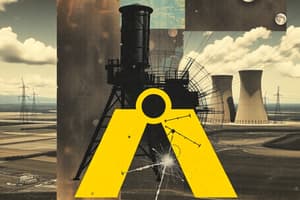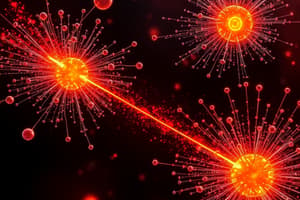Podcast
Questions and Answers
Neutrons have a positive charge.
Neutrons have a positive charge.
False (B)
Neutrons interact with nuclei via physical collisions.
Neutrons interact with nuclei via physical collisions.
True (A)
Neutrons can combine with a nucleus and emit a proton or alpha particle.
Neutrons can combine with a nucleus and emit a proton or alpha particle.
True (A)
The probability of neutron reactions depends on their kinetic energy.
The probability of neutron reactions depends on their kinetic energy.
Neutrons are classified according to their energy, with no precise agreement on the classification.
Neutrons are classified according to their energy, with no precise agreement on the classification.
What is the unit of neutron cross section?
What is the unit of neutron cross section?
How do neutrons slow down before being absorbed by a target nucleus?
How do neutrons slow down before being absorbed by a target nucleus?
At what energy range are neutrons classified as slow?
At what energy range are neutrons classified as slow?
What determines the probability of neutron interaction?
What determines the probability of neutron interaction?
What can a neutron emit when it combines with a nucleus?
What can a neutron emit when it combines with a nucleus?




